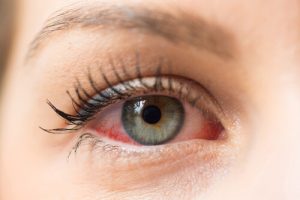How to Prevent the Spread of Pink Eye among Children

Conjunctivitis, more commonly known as pink eye, is a highly contagious eye infection. If you have a newborn baby that still breastfeeds at least every three hours, you’re probably wondering how to keep him from getting infected.
Today we’ll teach you to recognize the symptoms of pink eye and provide you with some tips to keep it from spreading to others.
How to prevent pink eye from spreading:
Conjunctivitis can affect anyone, no matter what their age. If you are infected and have a small baby, then you need to be especially careful and take extreme measures regarding hygiene.
This is especially true when you’re handling your child’s belongings or are holding your baby himself. Because your little one is so dependent on you, he is at more risk of being exposed to the germs that cause pink eye.
Washing your hands is the first measure of caution that you need to keep in mind. While handwashing may already be an activity that you carry out by habit, it’s even more important when it comes to pink eye.
You should wash your hands more often and more thoroughly, using plenty of soap and water.

Remember that you need to wash underneath your fingernails as well. To do so, use a soft nail brush that gets into the space between your nails and the skin on your fingers.
Also, the rest of the family should avoid using the same towel as the person with pink eye.
Even if you’re all used to sharing the same towel, when someone in the house has conjunctivitis, then each family member should have his own towel.
After you finish washing your hands, it’s important to use some sort of moisturizing lotion. Since you’re washing your hands so often, your skin may easily become dry and cracked.
Unfortunately, those little cracks can be a breading ground for germs and bacteria. So, to keep that from happening, keep your skin moisturized.
Other habits to help prevent the spreading of conjunctivitis to your baby
Conjunctivitis can be either bacterial or viral. Either way, it’s important to know that the germs and bacterias that cause pink eye aren’t only on your eyes. They can also be on your clothing, eyes, hands, and anything you touch.
Therefore, it’s important to extend your precautions to other areas as well to keep your little one free of infection.
Below is a list of tips to help you prevent the spread of infection to other family members in your home:
- Use clean clothing and change often. Put your dirty clothes directly in the hamper.
- Wash your face and neck. Also, when you wash your hands, wash all the way up to your elbows, at least.
- Don’t use makeup. Using cosmetics can cause more irritation. Furthermore, you could be spreading the germs to your makeup, only reinfecting yourself in the future.
- Wash your breasts and change your clothes before nursing your baby.
- You can’t control everything, but do everything you can to prevent spreading pink eye to your baby. We know this requires a great amount of sacrifice and attention to detail. But remember, you’re doing it to protect your baby and the rest of your family.

- Change your bedding often.
- If you use contact lenses, it’s better to use glasses for now, until the infection is gone. And, of course, wash them often.
- Don’t dry your eyes with the same towel more than once. Even if the towel looks clean, it’s most likely contaminated with germs or bacteria. When you need to wipe your eyes, use tissue or paper towel.
- Don’t rub your eyes. Even if you’re experiencing a lot of itchiness, rubbing your eyes will only prolong inflammation.
“If you’re infected and have a small baby, then you need to be especially careful and take extreme measures regarding hygiene. This is especially true when you’re handling your child’s belongings or holding your baby.”
Symptoms of pink eye
Conjunctivitis is a reddening and inflammation of the conjunctive. The conjunctive is the outer membrane that covers the white part of your eyeball.
The most obvious symptoms include itchiness, blurry vision, gooey secretions and watery eyes. These symptoms make pink eye very easy to recognize.
Therefore, if you notice that you or any family member are beginning to experience these symptoms, see a doctor. Don’t wait for the symptoms to go away on their own.
At the same time, don’t self-medicate or apply home remedies without consulting a specialist first. The first thing you should do is see an ophthalmologist who will be able to prescribe the right treatment.
Conjunctivitis, more commonly known as pink eye, is a highly contagious eye infection. If you have a newborn baby that still breastfeeds at least every three hours, you’re probably wondering how to keep him from getting infected.
Today we’ll teach you to recognize the symptoms of pink eye and provide you with some tips to keep it from spreading to others.
How to prevent pink eye from spreading:
Conjunctivitis can affect anyone, no matter what their age. If you are infected and have a small baby, then you need to be especially careful and take extreme measures regarding hygiene.
This is especially true when you’re handling your child’s belongings or are holding your baby himself. Because your little one is so dependent on you, he is at more risk of being exposed to the germs that cause pink eye.
Washing your hands is the first measure of caution that you need to keep in mind. While handwashing may already be an activity that you carry out by habit, it’s even more important when it comes to pink eye.
You should wash your hands more often and more thoroughly, using plenty of soap and water.

Remember that you need to wash underneath your fingernails as well. To do so, use a soft nail brush that gets into the space between your nails and the skin on your fingers.
Also, the rest of the family should avoid using the same towel as the person with pink eye.
Even if you’re all used to sharing the same towel, when someone in the house has conjunctivitis, then each family member should have his own towel.
After you finish washing your hands, it’s important to use some sort of moisturizing lotion. Since you’re washing your hands so often, your skin may easily become dry and cracked.
Unfortunately, those little cracks can be a breading ground for germs and bacteria. So, to keep that from happening, keep your skin moisturized.
Other habits to help prevent the spreading of conjunctivitis to your baby
Conjunctivitis can be either bacterial or viral. Either way, it’s important to know that the germs and bacterias that cause pink eye aren’t only on your eyes. They can also be on your clothing, eyes, hands, and anything you touch.
Therefore, it’s important to extend your precautions to other areas as well to keep your little one free of infection.
Below is a list of tips to help you prevent the spread of infection to other family members in your home:
- Use clean clothing and change often. Put your dirty clothes directly in the hamper.
- Wash your face and neck. Also, when you wash your hands, wash all the way up to your elbows, at least.
- Don’t use makeup. Using cosmetics can cause more irritation. Furthermore, you could be spreading the germs to your makeup, only reinfecting yourself in the future.
- Wash your breasts and change your clothes before nursing your baby.
- You can’t control everything, but do everything you can to prevent spreading pink eye to your baby. We know this requires a great amount of sacrifice and attention to detail. But remember, you’re doing it to protect your baby and the rest of your family.

- Change your bedding often.
- If you use contact lenses, it’s better to use glasses for now, until the infection is gone. And, of course, wash them often.
- Don’t dry your eyes with the same towel more than once. Even if the towel looks clean, it’s most likely contaminated with germs or bacteria. When you need to wipe your eyes, use tissue or paper towel.
- Don’t rub your eyes. Even if you’re experiencing a lot of itchiness, rubbing your eyes will only prolong inflammation.
“If you’re infected and have a small baby, then you need to be especially careful and take extreme measures regarding hygiene. This is especially true when you’re handling your child’s belongings or holding your baby.”
Symptoms of pink eye
Conjunctivitis is a reddening and inflammation of the conjunctive. The conjunctive is the outer membrane that covers the white part of your eyeball.
The most obvious symptoms include itchiness, blurry vision, gooey secretions and watery eyes. These symptoms make pink eye very easy to recognize.
Therefore, if you notice that you or any family member are beginning to experience these symptoms, see a doctor. Don’t wait for the symptoms to go away on their own.
At the same time, don’t self-medicate or apply home remedies without consulting a specialist first. The first thing you should do is see an ophthalmologist who will be able to prescribe the right treatment.
All cited sources were thoroughly reviewed by our team to ensure their quality, reliability, currency, and validity. The bibliography of this article was considered reliable and of academic or scientific accuracy.
CDC. (2015). Conjunctivitis ( Pink Eye ). https://doi.org/10.1016/B978-0-323-07909-9.00014-3
Mantelli, F., Lambiase, A., & Bonini, S. (2011). Clinical trials in allergic conjunctivits: A systematic review. Allergy: European Journal of Allergy and Clinical Immunology. https://doi.org/10.1111/j.1398-9995.2010.02536.x
This text is provided for informational purposes only and does not replace consultation with a professional. If in doubt, consult your specialist.








